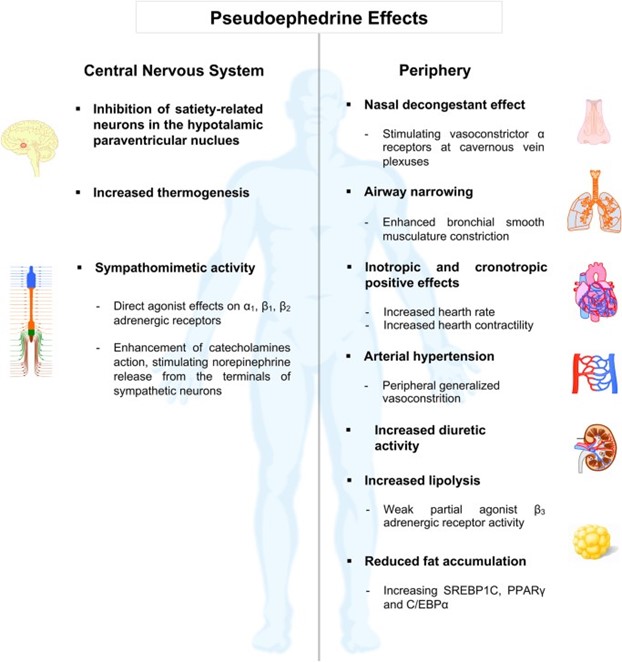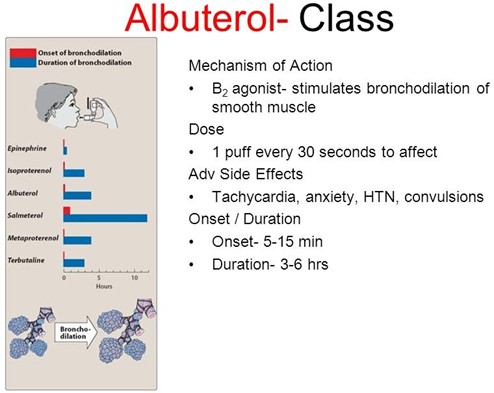A nurse is reviewing the medical record of a client who reports taking pseudoephedrine for sinus congestion as needed. The nurse should identify that pseudoephedrine is contraindicated for which of the following client conditions?
Migraines
Eczema
Hypertension
Diverticulitis
The Correct Answer is C
Pseudoephedrine is a sympathomimetic medication that acts as a decongestant by constricting blood vessels in the nasal passages, which helps to relieve sinus congestion. However, it can also cause vasoconstriction in other parts of the body, leading to an increase in blood pressure. Therefore, it is contraindicated for individuals with hypertension (high blood pressure).

The other conditions mentioned, migraines, eczema, and diverticulitis, are not contraindications for the use of pseudoephedrine. However, it is important for individuals with these conditions to consult their healthcare provider before taking pseudoephedrine, as it may interact with other medications or exacerbate certain symptoms.
Nursing Test Bank
Naxlex Comprehensive Predictor Exams
Related Questions
Correct Answer is B
Explanation
During an acute asthma attack, the airways become narrowed and inflamed, leading to symptoms such as wheezing, shortness of breath, and chest tightness. Short-acting beta2 agonists like Albuterol are the first-line medication for relieving acute asthma symptoms. They work by quickly relaxing the smooth muscles in the airways, resulting in bronchodilation and improved airflow. Albuterol provides rapid relief of symptoms and is often administered via inhalation.
A. Long-acting beta2 agonists (e.g., salmeterol) are typically used as maintenance therapy for long-term control of asthma symptoms, rather than for immediate relief during an acute attack.
C. Corticosteroids (e.g., fluticasone) are anti-inflammatory medications that are often prescribed for asthma, but they are more commonly used as part of a long-term management plan and may not provide immediate relief during an acute attack.
D. Anticholinergics (e.g., ipratropium) are sometimes used in combination with short-acting beta2 agonists for acute asthma exacerbations, but they are not typically the initial treatment choice for an acute asthma attack.
Correct Answer is ["C","D"]
Explanation
The nurse should make the following responses regarding how albuterol helps the client's breathing:
- The medication will open the airways.
- The medication will prevent wheezing.
Albuterol is a bronchodilator medication commonly used to treat respiratory conditions such as asthma and chronic obstructive pulmonary disease (COPD). It works by relaxing the smooth muscles in the airways, leading to the dilation of the bronchial tubes and increased airflow. This mechanism helps open up the airways and prevent or relieve symptoms such as wheezing, shortness of breath, and chest tightness.
The other options are incorrect because:
The medication will decrease coughing episodes: While albuterol may indirectly reduce coughing episodes by opening up the airways and improving airflow, its primary effect is on bronchodilation rather than directly targeting coughing.
The medication will stimulate the flow of mucus: Albuterol is not known to stimulate mucus flow. Instead, it focuses on bronchodilation to improve airflow in the lungs.
The medication will reduce inflammation: Albuterol is primarily a bronchodilator and does not have a significant anti-inflammatory effect. Other medications, such as corticosteroids, are typically used to address inflammation in respiratory conditions.

Whether you are a student looking to ace your exams or a practicing nurse seeking to enhance your expertise , our nursing education contents will empower you with the confidence and competence to make a difference in the lives of patients and become a respected leader in the healthcare field.
Visit Naxlex, invest in your future and unlock endless possibilities with our unparalleled nursing education contents today
Report Wrong Answer on the Current Question
Do you disagree with the answer? If yes, what is your expected answer? Explain.
Kindly be descriptive with the issue you are facing.
